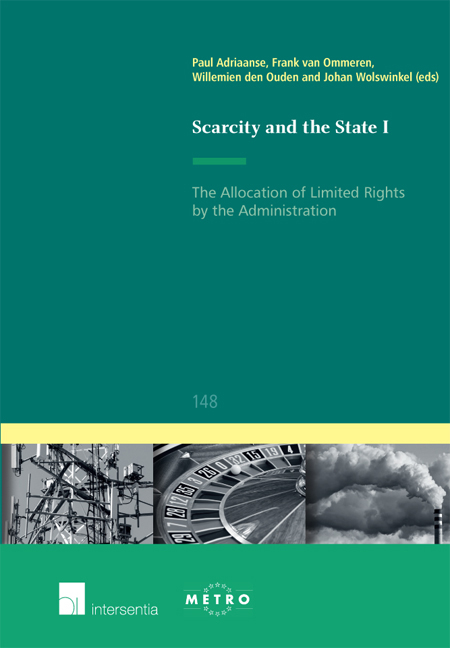Book contents
- Frontmatter
- Foreword
- Editors’ Preface
- Contents
- Part I General Perspectives
- Part II Eu Law Perspectives
- Chapter 6 Requirements under EU Law on the Allocation of Scarce European Subsidies
- Chapter 7 Τhe Allocation of Limited Authorisations under EU Internal Market Rules
- Chapter 8 The Need for Optimal Choice: Exploring a Hierarchy between Allocation Procedures for Limited Authorisations under EU Law
- Chapter 9 The Influence of EU State Aid Law on the Allocation of Limited Rights by National Authorities
- Chapter 10 Allocation of Limited Rights from a European Public Procurement Law Perspective
- Chapter 11 The Allocation of Limited Licences by the Administration – Requirements under the European Fundamental Right to Property
- Part III Comparative Law Perspectives
- List of Contributors
- Ius Commune Europaeum
Chapter 6 - Requirements under EU Law on the Allocation of Scarce European Subsidies
from Part II - Eu Law Perspectives
Published online by Cambridge University Press: 22 September 2018
- Frontmatter
- Foreword
- Editors’ Preface
- Contents
- Part I General Perspectives
- Part II Eu Law Perspectives
- Chapter 6 Requirements under EU Law on the Allocation of Scarce European Subsidies
- Chapter 7 Τhe Allocation of Limited Authorisations under EU Internal Market Rules
- Chapter 8 The Need for Optimal Choice: Exploring a Hierarchy between Allocation Procedures for Limited Authorisations under EU Law
- Chapter 9 The Influence of EU State Aid Law on the Allocation of Limited Rights by National Authorities
- Chapter 10 Allocation of Limited Rights from a European Public Procurement Law Perspective
- Chapter 11 The Allocation of Limited Licences by the Administration – Requirements under the European Fundamental Right to Property
- Part III Comparative Law Perspectives
- List of Contributors
- Ius Commune Europaeum
Summary
Introduction
For years, the European Union (hereinafter: the EU) has tried to achieve its policy objectives partly through the provision of European subsidies. These subsidies are not only provided by the European Commission and European executive agencies, but also by national authorities. Examples of European subsidies are the subsidies from the Structural Funds, which aim among other things to reduce the economic differences between EU regions, and the research and development grants that are provided under the so-called Horizon 2020 programme.
European subsidies qualify as public rights as this concerns individual rights which are granted by administrative authorities. More specifically it concerns claims to governmental support. Because there is a limited amount of funding available for most of the European subsidy programmes, as is the case for most national subsidies, it concerns limited public rights.
Because it is likely that the amount of European subsidies requested will exceed the limited budget, both European and national authorities responsible for the allocation of European subsidies will have to consider what requirements exist under European law in this allocation procedure. What allocation mechanism should be chosen, to what extent do the European general principles of equal treatment and transparency developed in procurement law apply and, if so, what obligations arise from these? These questions are considered for both the European subsidies that are provided by the European Commission and the European executive agencies, as well as the European subsidies that are provided by national authorities. This chapter will go on to demonstrate that for each category of European subsidies, differences exist with regard to the requirements for the allocation.
As a starting point the European rules applying in the programme period 2007–2013 have been chosen. This is due to the fact that there has not been much experience so far with the regulations for the current programme period 2014–2020 concerning the allocation of EU subsidies. Because these regulations were not adopted before December 2013, the Member States could only then start draft ing their own obligatory national programmes on the basis of which they intend to grant European subsidies. This means that most Member States allocated EU subsidies in the current programme period not earlier than the end of 2014.
- Type
- Chapter
- Information
- Scarcity and the StateThe Allocation of Limited Rights by the Administration, pp. 127 - 162Publisher: IntersentiaPrint publication year: 2016

